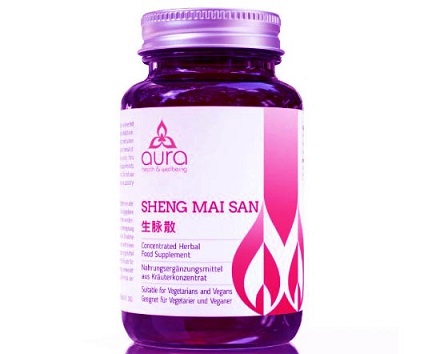Traditional Chinese medicine formula shows promise for treating inflammatory bowel disease
Nikhil Prasad Fact checked by:Thailand Medical News Team Aug 03, 2024 8 months, 1 week, 5 days, 20 hours, 16 minutes ago
TCM News: Researchers Highlight Sheng Mai San's Anti-inflammatory Potential
In a recent groundbreaking study, researchers from The Hong Kong Polytechnic University and Hangzhou Normal University have demonstrated the potential of Sheng Mai San (SMS), a traditional Chinese medicine formula, in treating inflammatory bowel disease (IBD). This
TCM News report delves into the significant findings and implications of their research, offering hope for a novel treatment approach for this chronic condition.
 Traditional Chinese medicine formula shows promise for treating inflammatory bowel disease
Understanding Inflammatory Bowel Disease
Traditional Chinese medicine formula shows promise for treating inflammatory bowel disease
Understanding Inflammatory Bowel Disease
Inflammatory bowel disease (IBD) is a chronic inflammatory condition of the gastrointestinal tract, including ulcerative colitis and Crohn's disease. It often leads to debilitating symptoms like abdominal pain, diarrhea, and weight loss, severely impacting patients' quality of life. Current treatments, such as corticosteroids and immunosuppressants, often come with significant side effects and limited long-term efficacy, highlighting the urgent need for safer and more effective therapies.
The Role of Sheng Mai San in Traditional Medicine
Sheng Mai San, a traditional Chinese medicine has been historically used to treat conditions related to Qi and Yin deficiency. Recently, its anti-inflammatory properties have been gaining attention, although its effects on the gastrointestinal system and its potential mechanisms in IBD have remained underexplored.
Sheng Mai San (SMS) is a unique traditional Chinese medicine formula composed of three main herbal ingredients:
-Ginseng Radix et Rhizoma (Ren Shen) - Ginseng root
-Ophiopogonis Radix (Mai Men Dong) - Ophiopogon root
-Schisandrae chinensis Fructus (Wu Wei Zi) - Schisandra fruit
These ingredients are combined in specific proportions to create the SMS formulation, traditionally used to treat conditions associated with Qi and Yin deficiency.
The Study's Objectives and Methods
The research aimed to investigate the therapeutic efficacy and underlying mechanisms of SMS in treating IBD. Using a DSS-induced acute colitis mouse model, the researchers evaluated various parameters, including body weight, stool consistency, rectal bleeding, colon length, and cytokine levels in colon tissues. Additionally, the study examined the anti-inflammatory activity of SMS in lipopolysaccharide (LPS)-induced macrophages.
Key Findings: SMS Ameliorates Colitis Symptoms
The study revealed that SMS significantly reduced disease severity in mice with DSS-induced colitis. Key observations included improved body weight, reduced disease activity index (DAI), and less histological damage in colon tissues. This article further elaborates that SMS-treated mice showed decreased levels of pro-inflammatory cytokines and less infiltration of immune cells in the colon,
indicating reduced inflammation.
Inhibition of Inflammatory Pathways
The researchers discovered that SMS inhibits several critical inflammatory pathways. In LPS-induced macrophages, SMS significantly reduced the production of pro-inflammatory cytokines and suppressed the activation of NF-κB, MAPK, and STAT3 signaling pathways. Moreover, SMS was found to inhibit the NLRP3 inflammasome, a key player in IBD pathogenesis, further underscoring its therapeutic potential.
Detailed Molecular Insights
The molecular analysis provided deeper insights into how SMS exerts its anti-inflammatory effects. The formula was shown to suppress the nuclear translocation of NF-κB/p65, thereby reducing NF-κB-mediated transcriptional activity. Furthermore, SMS inhibited the phosphorylation of key signaling proteins involved in MAPK and STAT3 pathways, contributing to its overall anti-inflammatory efficacy.
Potential Therapeutic Benefits
This study marks the first time SMS has been evaluated for its therapeutic potential in IBD, showing promising results in both in vivo and in vitro models. The findings suggest that SMS could be developed into a novel treatment option for IBD, offering a natural alternative with potentially fewer side effects compared to current therapies.
Conclusion and Future Directions
In conclusion, the research presents compelling evidence supporting the anti-inflammatory and therapeutic potential of Sheng Mai San in treating inflammatory bowel disease. The suppression of key inflammatory pathways, including NF-κB and NLRP3 inflammasome signaling, highlights the multifaceted approach of SMS in reducing intestinal inflammation and damage. As the study shows, SMS ameliorated colonic damage and reduced inflammation in DSS-induced colitis mice, indicating its promise as a therapeutic agent.
Further clinical trials are necessary to validate these findings in human subjects and to determine the optimal dosage and administration methods for SMS. If successful, SMS could become a valuable addition to the arsenal of treatments available for managing IBD, offering hope to millions of patients worldwide.
The study findings were published in the peer-reviewed journal: Frontiers in Pharmacology.
https://www.frontiersin.org/journals/pharmacology/articles/10.3389/fphar.2024.1426803/full
For the latest
TCM News, keep on logging to Thailand Medical News.
Read Also:
https://www.thailandmedical.news/news/new-hope-for-colorectal-cancer-treatment-traditional-chinese-medicine-takes-the-spotlight
https://www.thailandmedical.news/news/traditional-chinese-medicine-shows-promise-for-treating-insomnia
